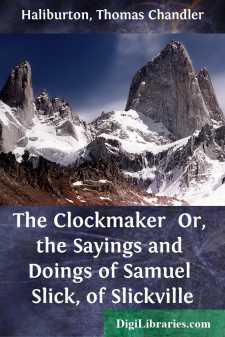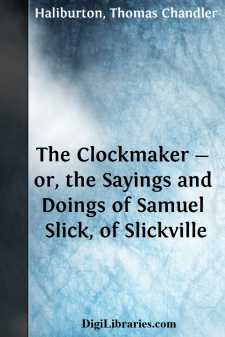Categories
- Antiques & Collectibles 13
- Architecture 36
- Art 48
- Bibles 22
- Biography & Autobiography 813
- Body, Mind & Spirit 142
- Business & Economics 28
- Children's Books 17
- Children's Fiction 14
- Computers 4
- Cooking 94
- Crafts & Hobbies 4
- Drama 346
- Education 46
- Family & Relationships 57
- Fiction 11829
- Games 19
- Gardening 17
- Health & Fitness 34
- History 1377
- House & Home 1
- Humor 147
- Juvenile Fiction 1873
- Juvenile Nonfiction 202
- Language Arts & Disciplines 88
- Law 16
- Literary Collections 686
- Literary Criticism 179
- Mathematics 13
- Medical 41
- Music 40
- Nature 179
- Non-Classifiable 1768
- Performing Arts 7
- Periodicals 1453
- Philosophy 64
- Photography 2
- Poetry 896
- Political Science 203
- Psychology 42
- Reference 154
- Religion 513
- Science 126
- Self-Help 84
- Social Science 81
- Sports & Recreation 34
- Study Aids 3
- Technology & Engineering 59
- Transportation 23
- Travel 463
- True Crime 29
The Attache; or, Sam Slick in England - Complete
Description:
Excerpt
CHAPTER I. UNCORKING A BOTTLE.
We left New York in the afternoon of — day of May, 184-, and embarked on board of the good Packet ship "Tyler" for England. Our party consisted of the Reverend Mr. Hopewell, Samuel Slick, Esq., myself, and Jube Japan, a black servant of the Attache.
I love brevity—I am a man of few words, and, therefore, constitutionally economical of them; but brevity is apt to degenerate into obscurity. Writing a book, however, and book-making, are two very different things: "spinning a yarn" is mechanical, and book-making savours of trade, and is the employment of a manufacturer. The author by profession, weaves his web by the piece, and as there is much competition in this branch of trade, extends it over the greatest possible surface, so as to make the most of his raw material. Hence every work of fancy is made to reach to three volumes, otherwise it will not pay, and a manufacture that does not requite the cost of production, invariably and inevitably terminates in bankruptcy. A thought, therefore, like a pound of cotton, must be well spun out to be valuable. It is very contemptuous to say of a man, that he has but one idea, but it is the highest meed of praise that can be bestowed on a book. A man, who writes thus, can write for ever.
Now, it is not only not my intention to write for ever, or as Mr. Slick would say "for everlastinly;" but to make my bow and retire very soon from the press altogether. I might assign many reasons for this modest course, all of them plausible, and some of them indeed quite dignified. I like dignity: any man who has lived the greater part of his life in a colony is so accustomed to it, that he becomes quite enamoured of it, and wrapping himself up in it as a cloak, stalks abroad the "observed of all observers." I could undervalue this species of writing if I thought proper, affect a contempt for idiomatic humour, or hint at the employment being inconsistent with the grave discharge of important official duties, which are so distressingly onerous, as not to leave me a moment for recreation; but these airs, though dignified, will unfortunately not avail me. I shall put my dignity into my pocket, therefore, and disclose the real cause of this diffidence.
In the year one thousand eight hundred and fourteen, I embarked at Halifax on board the Buffalo store-ship for England. She was a noble teak built ship of twelve or thirteen hundred tons burden, had excellent accommodation, and carried over to merry old England, a very merry party of passengers, quorum parva pars fui, a youngster just emerged from college.
On the banks of Newfoundland we were becalmed, and the passengers amused themselves by throwing overboard a bottle, and shooting at it with ball. The guns used for this occasion, were the King's muskets, taken from the arm-chest on the quarter-deck. The shooting was execrable. It was hard to say which were worse marksmen, the officers of the ship, or the passengers. Not a bottle was hit: many reasons were offered for this failure, but the two principal ones were, that the muskets were bad, and that it required great skill to overcome the difficulty occasioned by both, the vessel and the bottle being in motion at the same time, and that motion dissimilar....






